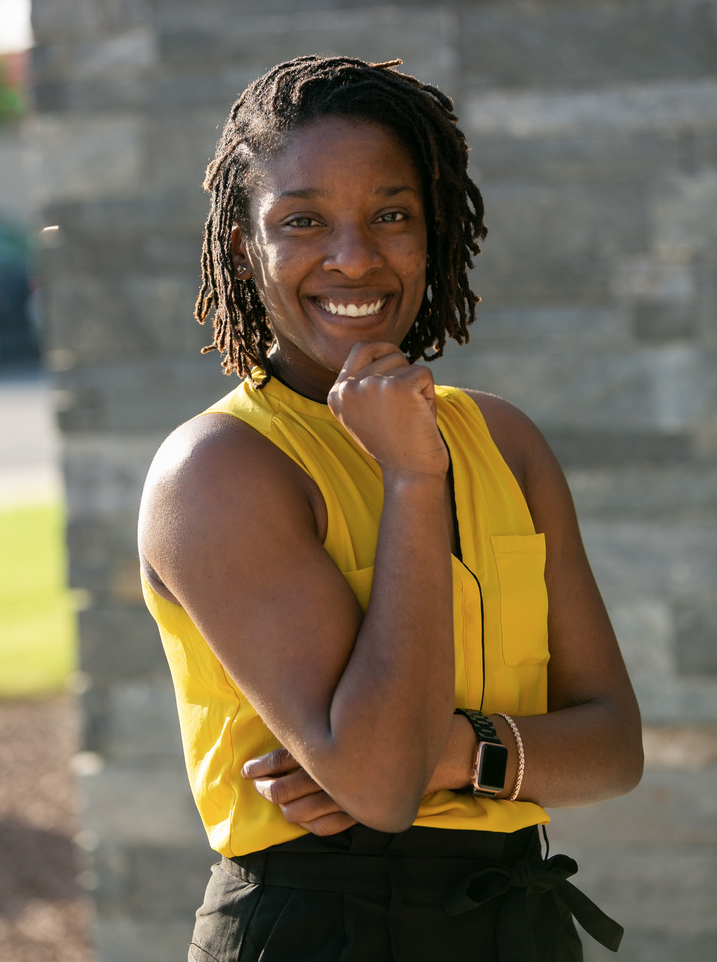![]()
[hr]A Jackson State University alum made history this month by becoming the first African-American woman to earn a Ph.D. in computer science from Purdue University, and she wants others to dream big, too, even if they’re not straight-A students – because she wasn’t either.
In fact, Dr. Amber Johnson, 30, a Jackson native, was determined. And that determination led to research that potentially could benefit people suffering from various diseases, but especially one that directly has impacted her family. Recently, she lost an aunt to chronic obstructive pulmonary disorder (COPD).

By incorporating Big Data, she was able to extract information to determine the most effective times and doses of medication to treat life-threatening COPD. She gathered data by teaming with Purdue’s engineering center and scientists. Now, the results have a “much greater impact than I ever imagined by calculating how soon we should give antibiotics and for reviewing historical data to determine the best treatment.”
Johnson’s launch into STEM was natural and also had led her to pursue a master’s degree in computer science from JSU’s College of Science, Engineering and Technology (CSET).
“I’ve always been really curious, trying to figure out things and taking them apart – VCRs and bicycles – just real-life problem-solving. In school I paid a lot more attention in mathematics classes,” she said. Her mother, also a JSU alum, urged her to major in computer science. At first, Johnson wasn’t so keen to the idea. Later, however, she decided to give it a try. Now, people can refer to her as Dr. Johnson.
[dropcap]T[/dropcap]O help her power through the rigorous Purdue program and adjust to the Midwest culture, Johnson relied on her gregarious personality because the environment was strikingly different from her roots in the South. In the region where she grew up, and after her years at predominantly black Lanier High School, she attended all HBCUs. These were LeMoyne-Owen College in Memphis, Tougaloo College and JSU, where she earned her master’s degree in computer science at the state’s urban institution.
As a pioneer, Johnson said she hopes to inspire others to pursue similar degrees regardless of “where you’re from or your cultural background. You can do whatever you desire. God intended for me to complete this program, but It’s not just for me.” She said help came from channeling inspiration from someone, in particular, whose path she followed.
That person was prolific inventor Henry T. Sampson. He was known for creating a device to generate power from a nuclear reactor. He also attended Lanier High School and Purdue University just like she did. Later, Sampson would donate his massive film memorabilia to JSU, where it’s housed in the library named after his father, Henry T. Sampson Sr., who was a former executive dean at the HBCU.
There have been others who motivated her, too, Johnson said. “I’m holding on to James Meredith who integrated Ole Miss and Kyla McMullen, the first woman of color to graduate with a Ph.D. in computer science from the University of Michigan. There’s always a number of people to add to the list of encouragement. So, for me, this is a very powerful title to hold as the first African-American woman to earn a Ph.D. at Purdue. It’s for everyone; it’s for my grandmother; and it’s for the woman I met in Walmart who offered to bake banana bread for me.”
In addition, she said she owes a huge debt of gratitude to Dr. Raquel Hill, who was the first African-American to earn her Ph.D. in computer science from Harvard years ago. “She got me right with my dissertation.”
Although Johnson chose predominantly white Purdue without knowing much about the university, she said previous involvements in tennis and other activities throughout Mississippi and beyond indoctrinated her into a diverse society. Nevertheless, she said Purdue was challenging at first because she was unable to find a community or people who mirrored her. Moreover, a majority of the people in her department were international students. Still, though, she salutes Purdue for striving to increase diversity.

The greatest challenges, though, resulted during her second year. This was mainly due to the culture and limited diversity on campus. However, she said Purdue continues to make strides by developing a more heterogeneous environment.
[dropcap]T[/dropcap]O adjust further to the campus, Johnson joined or developed new organizations. In her department, she was president of the graduate student board, which created a peer-mentor program and a “Social Power Hour.” These were meant to facilitate dialogue, help fellow students seek answers to problems and create a social network – especially for peers who don’t have friends or family connections to the Hoosier state.
In contrast, she notes that JSU provided a more nurturing atmosphere. “You have professors who are looking for you if you don’t show up. And, if you don’t understand a problem, you can go to their offices, or you can get help from a study group that’s easily accessible.”
In particular, Johnson credits former JSU professor Dr. Charles Bland for introducing her to research. She said he also encouraged her to apply to a STEM-preparation program for underrepresented undergraduate minority students called the Louis Stokes Mississippi Alliance for Minority Participation (LSMAMP). It was through that program that she was able to study in China and learn about its different culture.
So, what’s next for the newly minted doctor?
Johnson has been accepted into a Future Technical Leader (FTL) program that recruits and offers professional development opportunities to highly capable, up-and-coming technologists and leaders.
Over three years, she will rotate to various offices within the Northrop Grumman corporation, and the program will provide more exposure by allowing her the opportunity to work in areas different from her Ph.D. research.
Still, for those who may doubt their abilities, Johnson offered this:
“I’m just a kid from Jackson, Mississippi. I’m a positive product of my environment. My environment has embraced me. I’m just taking advantage of opportunities and sacrifices that other people provided to me.”






